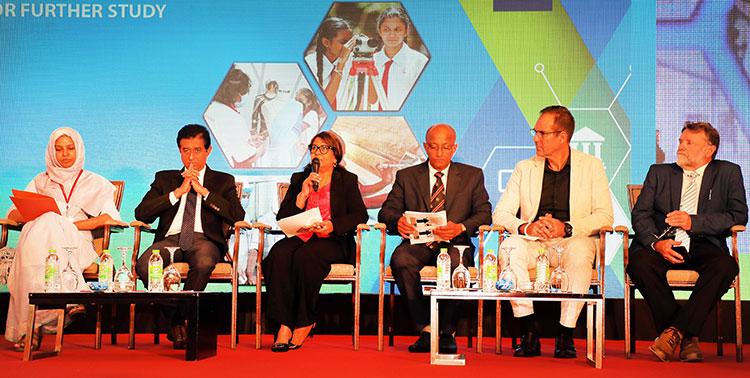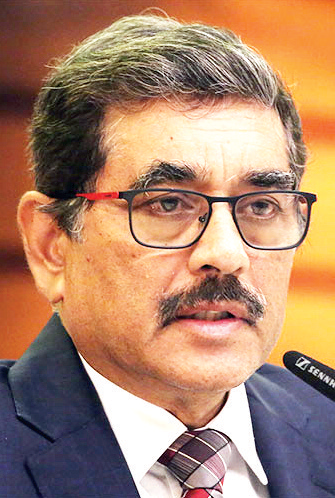Business
ADB steps forward to turn the page on Career Skills and Training in Sri Lanka

‘Sri Lanka’s vocational training is like a railway network that connects only a few destinations’
‘We need to think creatively and put our vocational education students in a go-anywhere SUV’
‘ Training needs to cater to the ambitions of the youth participating in TVET education’
By Sanath Nanayakkare
The Asian Development Bank (ADB) recently brought together key stakeholders of the Technical and Vocational Education and Training (TVET) sector in Sri Lanka, identifying it as a crucial sector for socio-economic rejuvenation in the short to medium term.
The Serendipity Knowledge Programme (SKOP) hosted by the ADB at Cinnamon Lakeside Colombo opened the minds of the audience to see things from new perspectives as the event converged international experts along with local stakeholders from the public and private sectors to share their insights on the topic.
Addressing the SKOP forum which is dedicated to identifying knowledge solutions, Gi Soon Song, Director Human and Social Development Sector Office ADB said that the Bank would bring in necessary resources to empower the TVET sector in Sri Lanka.
“We will be bringing in not only financial resources for elevating the TVET sector in Sri Lanka but also good advice, good practices, encouragement and compliments. But sometimes we may have to tell you that a particular thing may not work. I hope you will bear with us on such occasions because ADB is going to be involved in empowering Sri Lanka’s skills development sector on a long term basis. Together we need to create multiple career pathways for the youth to realize their full potential to uplift their own lives, serve their community meaningfully and also contribute to nation rebuilding. I have been visiting Sri Lanka since 2013 and have met with many of the TVET stakeholders belonging to different sub sectors of education and found that each sub sector has its own challenges.
School education has its own challenges, higher education has challenges unique to it, and of course, TVET sector has a LOT of challenges considering the complexity it has to deal with. It encounters the need for engaging with employers and industries, understanding the labor market demand, providing correct career guidance and training to vocational education students, addressing the mismatch between what the training offers and what the workplace requires which is always changing. Furthermore, the vocational training programmes need to cater to the aspirations of the youth in terms of their interests and also what they want to earn from participating in their chosen vocation.
Another challenge encountered by TVET is sometimes students may feel it like a dead-end or an inferior option to higher education. As a result, some TVET students may get disheartened. In this context, the multiple pathways we are discussing here today would be very important. They would present to you the ‘avenues’ or the ‘menu of options’ for the youth who are looking to transition towards multiple and flexible education and skills pathways to work or further study. These options would offer them leeway according to their circumstances and aspirations allowing them multiple ways which they can explore and realize their potential.”
She however said that on the journey to transform the TVET sector, the collaborators in the school system, the higher education system and the vocational course providers may face a lot of stumbling blocks and compartmentalized thinking in terms of each other’s territories.
“That is a major pain point where we shouldn’t lose our primary goal of recognizing the urgent need for education and skills reform and creating better solutions for our youth to unleash their full potential to achieve upward mobility. Sri Lanka’s TVET system is like a railway network that connects only a few destinations. Together we need to think creatively and innovatively and put our vocational education students in a go-anywhere SUV,” she said.
The participants at the forum were convinced that the Asian Development Bank which has stuck with Sri Lanka through thick and thin would fuel this mission too by providing the necessary resources, to tackle one of the most pressing challenges in training the Sri Lankan youth to take their skills to the next level.
“Now the ball is in policymakers’ and TVET practitioners’ court,” the participants were heard saying.
Business
Salesforce Startup Program targets Sri Lanka’s high-growth tech sector

Salesforce, the world’s leading AI-powered CRM platform, is set to expand its presence in Sri Lanka with the launch of the Salesforce Startup Program by the end of January 2026, signalling growing confidence in the country’s technology-led growth potential.
The move comes as Sri Lanka consolidates its position as the second-largest startup ecosystem in South Asia after India, with software, data and artificial intelligence-driven ventures accounting for nearly 60 per cent of the national startup base.
Industry observers say this concentration places Sri Lanka at a decisive stage where global exposure and enterprise access could unlock the next phase of scale.
Under the programme, Sri Lankan startups will gain access to Salesforce’s global ecosystem, including AI-powered platforms, business and technical mentorship, joint go-to-market opportunities and connections to enterprise customers, enabling founders to build globally competitive solutions from Sri Lanka.
“Sri Lanka has developed a strong base of technical talent and entrepreneurial ambition that is increasingly visible regionally and globally,” said Arundhati Bhattacharya, President and CEO of Salesforce South Asia.
“Through the Salesforce Startup Program, we aim to help startups move beyond early momentum to global relevance while delivering long-term economic impact,” he added.
He also said the initiative builds on the success of its Startup Program in India and Singapore, which today supports over 435 startups, including more than 230 AI-first companies. Several participants have expanded across Asia and beyond by building products natively on the Salesforce platform.
Responding to queries, he said Sri Lanka is also emerging as an important enterprise market for Salesforce, with major corporates such as John Keells Holdings and Cinnamon Hotels adopting the platform to modernise customer engagement, sales, marketing and loyalty management operations.
In parallel, Salesforce is strengthening the country’s digital talent pipeline through its Trailhead learning ecosystem, with plans to skill nearly 1,000 learners over the next year via local workforce development partners and community-led cohorts.
Chamil Madusanka, Head of Salesforce Practice and Salesforce Architect, said the programme arrives at a critical juncture for Sri Lanka’s startup ecosystem.
“Sri Lankan founders are increasingly building AI, data and enterprise software solutions with global relevance,” Madusanka told The Island Financial Review.
“What many startups need is structured access to enterprise customers, global mentorship and market exposure. This initiative creates that bridge, enabling local companies to scale faster while remaining rooted in Sri Lanka.”
He said the Startup Program is designed to act as a connective platform, bringing together startups, enterprises, technology partners, universities and developer communities to accelerate collaboration and innovation.
By Ifham Nizam ✍️
Business
Good news on risen foreign reserves exerts buoyant impact on bourse

CSE activities were extremely bullish yesterday following Central Bank Governor Dr Nandalal Weerasinghe’s announcement that Sri Lanka’s foreign reserves had risen to US $ 6.8 billion in December 2025, up US$ 791 million from November 2025.
The Governor provided the estimated economic growth while announcing the Central Bank’s policy agenda for this year.
In December Sri Lanka received budget support loans from the Asian Development Bank and the International Monetary Fund.
Amid these developments both CSE indices moved upwards. The All Share Price Index went up by 226.81 points, while the S and P SL20 rose by 100.01 points. Turnover stood at Rs 12.3 billion with 12 crossings.
Top seven crossings that mainly contributed to the turnover were: Lee Hedges 18.2 million shares crossed to the tune of Rs 3.9 billion; its shares traded at Rs 416, Commercial Bank 2.1 million shares crossed for Rs 467.6 million; its shares traded at Rs 215, Ceylon Hotels 429,000 shares crossed for Rs 128.7 million; its shares traded at Rs 300, LB Finance 650,000 shares crossed for Rs 105 million; its shares sold at Rs 152.50, Ceylinco Holdings 31000 shares crossed for Rs 104.5 million; its shares traded at Rs 3400, Melstacorp 200,000 shares crossed tfor Rs 35.7 million; its shares sold at Rs 178.50 and Three Acres Farm 400,000 shares crossed to the tune of Rs 29.6 million; its shares fetched Rs 740.
In the retail market top seven companies that mainly contributed to the turnover were; Wealth Trust Securities Rs 1.17 billion (55.8 million shares traded), Commercial Bank Rs 509 million (2.4 million shares traded), HNB Rs 370 million (870,000 shares traded), ACL Cables Rs 303 million (three million shares traded), Prime Lands Residencies Rs 283 million (7.9 million shares traded), Lanka Realty Rs 227.5 million (4.7 million shares traded) and HNB Rs 218 million (332,000 shares traded). During the day 223.7 million share volumes changed hands in 55116 transactions.
Yesterday, investor interest in Wealth Trust and banking stocks led to higher activity levels, brokers said. Further, the real estate sector also performed well. Lanka Realty Investments PLC acquired 51 percent of the total number of shares in issue of Lee Hedges, CSE sources said. 13,057,595 ordinary voting shares were bought at Rs 216 each.
Yesterday the rupee opened at Rs 310.12/18 to the US dollar in the spot market, weaker from Rs 310.05/15 the previous day, dealers said, while bond yields opened marginally high.
By Hiran H Senewiratne ✍️
Business
Launch of monograph ‘Development: Not By Economics Alone’

The Gamani Corea Foundation (GCF) is pleased to announce the launch of the monograph Development: Not By Economics Alone by Dr. Nimal Sanderatne, Emeritus Chairperson of the Foundation. The foreword to the publication has been written by Dr. Godfrey Gunatilleke, one of Sri Lanka’s most eminent development economists. The launch ceremony will be held on Friday, 9th January 2026, at 4.00 p.m. at the Horton Lodge.
In this monograph, Dr. Sanderatne argues that development cannot be understood through economic indicators alone. He emphasizes that the quality of human capital depends not only on knowledge and skills acquired through formal education, but also on deeper, non-formal processes embedded in a society’s culture and value systems. These influence human behaviour, shaping work ethics, attitudes to work and leisure, capacity for teamwork, preferences between short- and long-term goals, and patterns of saving and consumption.
Dr. Sanderatne is a distinguished economist and academic, holding degrees from the Universities of London, Saskatchewan, and Wisconsin, and was conferred the Doctor of Science (Honoris Causa) by the University of Peradeniya in 2004.
-

 News4 days ago
News4 days agoInterception of SL fishing craft by Seychelles: Trawler owners demand international investigation
-

 News4 days ago
News4 days agoBroad support emerges for Faiszer’s sweeping proposals on long- delayed divorce and personal law reforms
-

 Opinion14 hours ago
Opinion14 hours agoThe minstrel monk and Rafiki, the old mandrill in The Lion King – II
-

 News5 days ago
News5 days agoPrivate airline crew member nabbed with contraband gold
-

 News3 days ago
News3 days agoPrez seeks Harsha’s help to address CC’s concerns over appointment of AG
-

 Features14 hours ago
Features14 hours agoThe Venezuela Model:The new ugly and dangerous world order
-

 Latest News1 day ago
Latest News1 day agoWarning for deep depression over South-east Bay of Bengal Sea area
-

 News3 days ago
News3 days agoGovt. exploring possibility of converting EPF benefits into private sector pensions
























